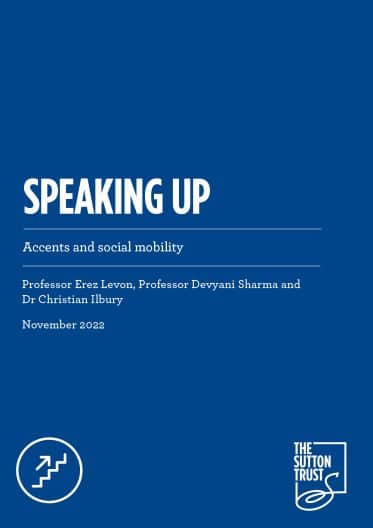The following recommendations are for any employer, but particularly for elite professions, HR teams, the civil service, schools, and universities.
- Action to tackle accent bias should be seen as an important diversity issue in the workplace, alongside efforts to tackle other types of discrimination such as sexism, racism or ableism. Efforts to tackle accent bias should be part of a wider strategy within organisations to improve socio-economic diversity of the workforce, and instances of accent discrimination should be taken seriously by employers.
- Recruiters should undergo training to help to reduce any accent biases. For a simple approach which is easily implementable, recruiters can read the following text before a recruitment task, to reduce their reliance on accents to infer skills. There is evidence that doing so can significantly reduce accent-based differences in ratings of the same response:
Recent research has shown that, when evaluating candidates’ performance, interviewers in the UK can be influenced by the candidates’ accents of English. In particular, they tend to rate candidates who speak with a “standard” accent more favourably than candidates who speak with “non-standard” accents. This is an example of so-called “accent bias”. The focus should be on the knowledge and skills of the candidate, not their accent. Please keep this in mind when assessing the suitability of candidates.
- Employers should aim to have a range of accents within their organisation, and not require or encourage their employees to adopt Received Pronunciation (also known as ‘Queen’s English’ or ‘BBC English’) in the workplace. Unconscious bias training only raises awareness of implicit biases, it does not eliminate As long as we hear the same accents in certain workplaces, we will not be used to hearing others in those contexts, and our unconscious biases will remain in place. Encouraging employees to change their accents will maintain an over-representation of RP in contexts of authority, and such an expectation also places an unequal cognitive burden on certain applicants and employees.
- There should be no implicit expectation within the workplace that professionalism is signalled by sounding like a person from a certain region, socio-economic background, or who has had a public school education. This middle-class norm is not equally accessible to all and creates serious inequality throughout the A more appropriate professional trait for contemporary times is an ability to expect and work with diverse cultures and social backgrounds in the workplace.
- Action to tackle accent biases and prejudice should take into account work-associated social settings. Accent-related commentary and mockery are highest in social settings, and this can compromise a person’s sense of belonging in a given professional or educational community. There should be awareness among employees of the implications of such practices among colleagues beyond the workplace.
